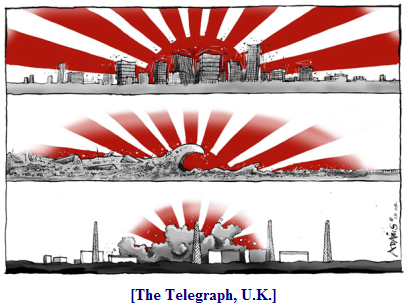
How dramatically will Japan’s nuclear catastrophe affect the rest of the world? According to this editorial from Germany’s Die Welt, to address the ever-growing dangers and fears of nuclear power will require at least as much time, dedication and money as the developed world has spent on securing itself from terrorism since September 11, 2001.
The Die Welt editorial says in small part:
The earthquake of March 11, 2011 was no terrorist attack. But its political and psychological impact will be as great as September 11, 2001, because it has shown what a terrorist attack on a nuclear power plant would look like. The earthquake in Northern Japan that had a magnitude of 9.0 on the Richter scale and the ensuing tsunami was almost an exact mirror of the great Lisbon earthquake of 1755. And just as it was 250 years ago, the aftereffects will overwhelm Europe – politically, economically and culturally.
The supersonic aircraft Concorde was shut down completely, when, ten years ago, human error destroyed its aura of accident-free progress. There were alternatives. Trans-Atlantic shipping continued a hundred years ago, after hubris had led to the demise of the Titanic. Back then, there were no alternatives. Nuclear energy was further developed, despite the explosion at Chernobyl 25 years ago. While there were alternatives, they were expensive, and the cause that led to the disaster – an ill-considered experiment possible only in a command economy without checks and balances – appeared to have been eliminated just three years later with the collapse of the Soviet bloc. Chernobyl was a special case. Nuclear energy was viewed with suspicion but was accepted as long as modern democracies controlled it with security precautions.
That’s over now. Confidence in redundant, coincidence-proof security precautions has been wiped out by Fukushima. Japan’s high-tech democracy has demonstrated what can happen if a cyber-attack on German or French nuclear reactors were to occur, as it did with the use of the Stuxnet computer worm against Iran’s nuclear program; or if a determined, tech-savvy terrorist group were to seize control of a nuclear power plant. We knew all this before, but seeing it makes all the difference.
If the earthquake shifted the Earth’s axis, it shifted its political axis just as much. … To be motivated by fear and to give in to uncontrolled reactions is no more a solution now then it was after the 9-11 attacks. Since March 11, however, the industrialized nations have been faced with a similarly gargantuan task: They must contain a hazard that will require a financial, technical and political effort at least as large as safeguarding themselves against radical Islam.”
READ THE REST AT WORLDMEETS.US, your most trusted translator and aggregator of foreign news and views about our nation.
















